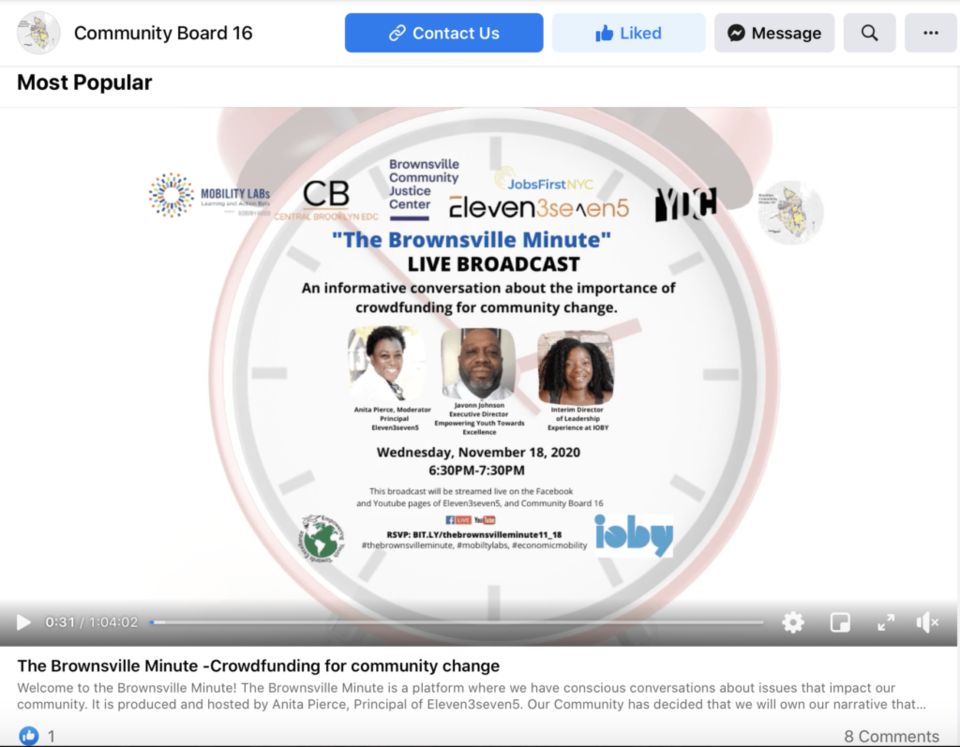By Denny Jacob
Depending on where you live, local and hyperlocal news isn't being covered. While Brooklyn-centric outlets report on the entire borough as much as possible, gaps in coverage remain for neighborhoods like Ocean Hill-Brownsville. But The Brownsville Minute is looking to change that.
As more people get their news from social media and remain indoors as the COVID-19 pandemic rages on, the new platform is providing residents with greater access to information about their own community.
"If you are not connected to a credible source within the community, you don't really know what's happening unless you hear it from a neighbor or if you're on social media," said Pierce, the show's host and producer and chairperson of Community Board 16's communication committee.
The Brownsville Minute's long-term strategy is to close the gap in communications, promote the work of local-based community organizations and entrepreneurs and facilitate healthy conversations. In addition to the show, email and word of mouth communication from credible community residents are part of a larger effort to relay information to residents in multiple ways.

Community Board 16, which represents the Ocean Hill-Brownsville, live-streams the show on Wednesday or Thursday at 6 pm on a biweekly basis via its Facebook and YouTube pages. Residents who tune in can ask questions or voice their opinions in the comment section on either social media platform, which Pierce monitors and relays to guests on the show.
Pierce said The Brownsville Minute was formed as a direct response to the pandemic in order to relay information about where COVID-19 testing was taking place and what food resources were available to those who needed it.
"The Brownsville Minute came at a time where we were at the beginning of aiming to figure out why we are and why some residents [are] not receiving communications or information within the community," says Pierce.
Information disparities in communities can be tied to a decline in local news. The United States has lost almost 1,800 newspapers since 2004, according to "The Expanding News Desert," a study conducted by the University of North Carolina's Penelope Muse Abernathy. But the report notes that a range of entrepreneurs are experimenting with new business models and new ways of providing local news.
"There is an opportunity for local and smaller news sites to start especially with the barrier to entry being so low and cheap with the internet and email newsletters," said Scott Talan, assistant professor at American University's School of Communication.
The first episode of The Brownsville Minute appeared on the community board's Facebook page in April. The show's format now tends to begin with information on COVID-19 testing, a roundup of upcoming community events and then switches to introduction from Pierce and a preview of what will be discussed with the episode's guests. Topics have discussed filling out the census, women's health concerns, crowdfunding, reimagining policing and understanding what role elected officials play in a community.
A recent episode featured Councilmember Alicka Ampry-Samuel and Assemblywoman Latrice Walker, two local elected officials for Ocean Hill-Brownsville. The 90-minute episode discussed what the women are responsible for as elected officials, why they decided to serve their community, what they struggle with and how important the presidential election is.
The less formal format allowed Ampry-Samuel and Walker to be more candid in their thoughts and opinions. At one point, Pierce noted that she felt like she was talking to them on her couch.
"We love non-traditional media because it gives us a chance to meet all neighbors," said Ampry-Samuel in an email.
Like any other platform looking to inform a particular audience, success will be measured by both its content and reach. Athenia Rodney, 38, owner of Umoja Events, believes there isn't enough awareness about what The Brownsville Minute is and what it's talking about.
Rodney said she heard about the show from someone on the community board and has even appeared as a guest. But she hasn't told people about it because she's unclear about the show's schedule and hasn't seen any fliers. In order to reach a wider audience, Rodney believes outreach must go beyond just social media and that the show must be consistent. She also noted that as COVID-19 has more people home in front of their computer, relying on a service like Eventbrite could help users plan ahead and remind them to tune in when The Brownsville Minute begins a live-stream.
The bright spot for The Brownsville Minute has been its content. Rodney has enjoyed the variety of members from the community and learning about people she was previously unaware of.
"There are a lot of diamonds in what people have typically narrated as being rough," said Rodney. "I want to put it in that capacity because although the outside community labels Brownsville as the roughest, toughest community, there are a lot of gems. There are a lot of businesses that are doing some really amazing things."
This has been a focal point for Pierce, who has deliberately focused on Ocean Hill-Brownsville's achievements during the pandemic rather than subjects like crime and poverty. Pierce, whose experience includes serving as co-chair of conference planning committees and award galas, hopes The Brownsville Minute creates a pipeline of information that uplifts the community voice and supports the positive narrative of what is happening on the ground.
"This community has decided to change the narrative of what is being consistently promoted in mainstream news media about Ocean Hill-Brownsville," said Pierce.



